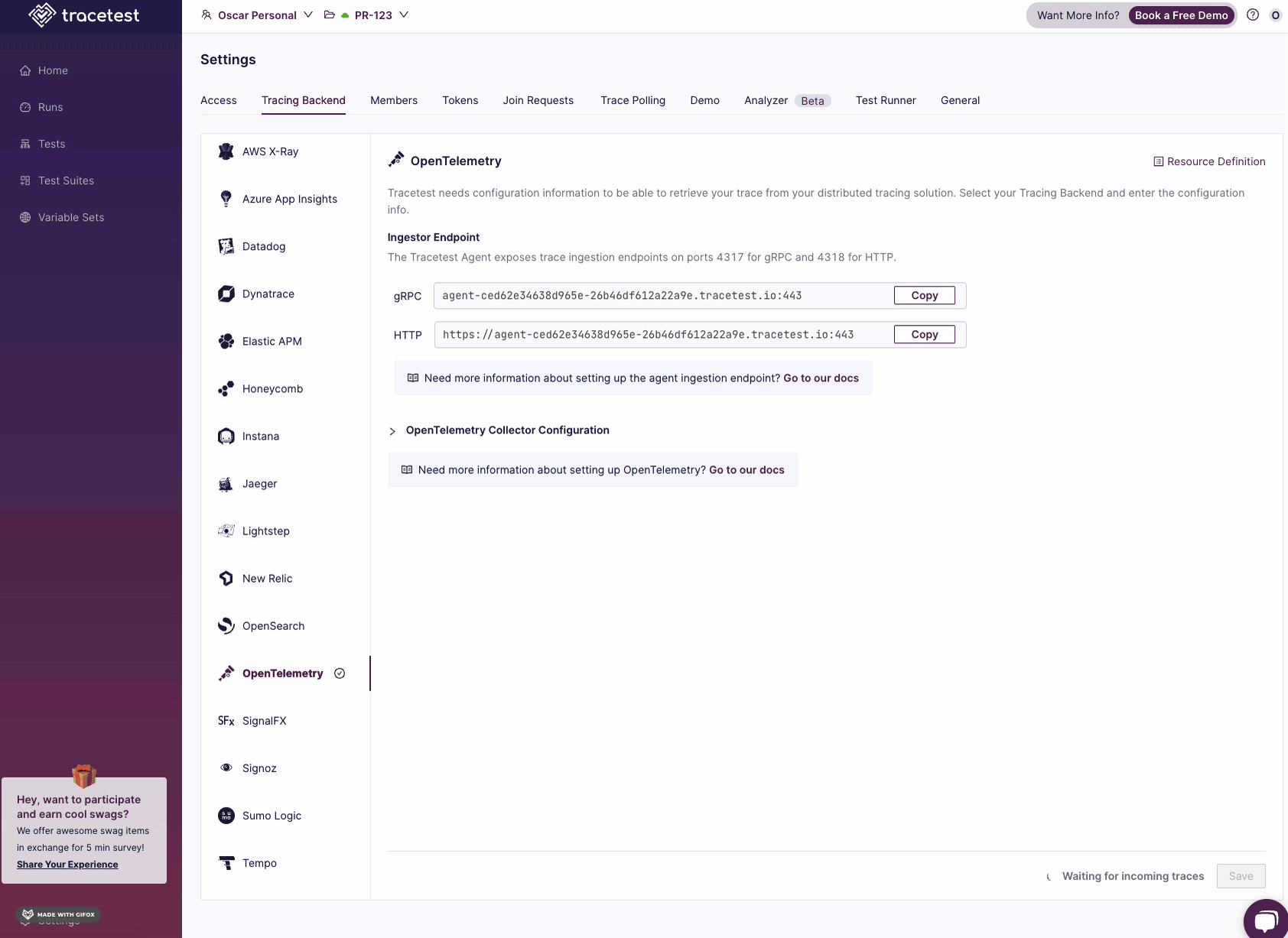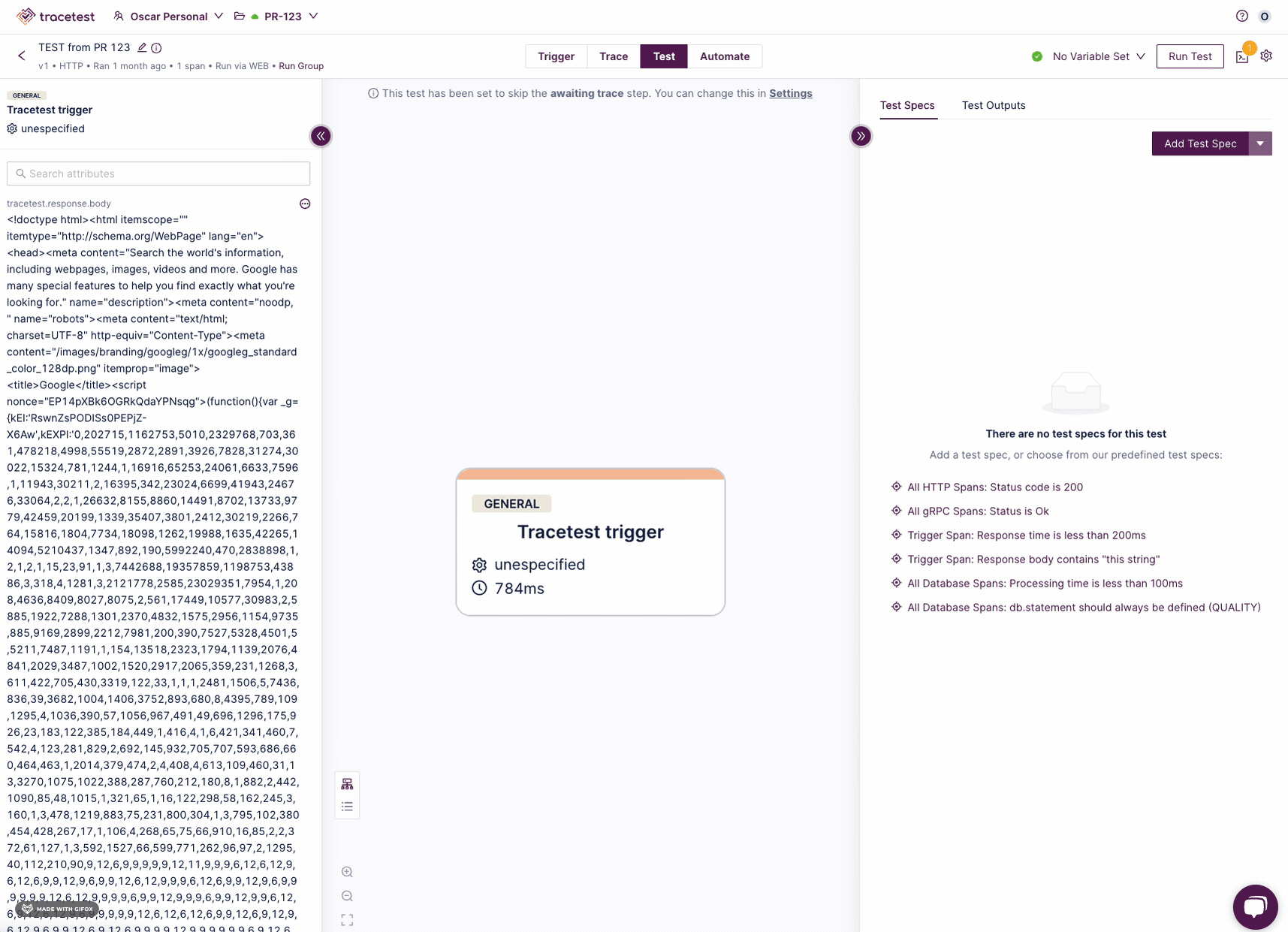Automatically Provisioning a Developer Environment from the Tracetest CLI
The features described here are compatible with the Tracetest CLI v1.2.0 and above.
Tracetest is a testing tool based on OpenTelemetry that permits you to test your distributed application. It allows you to use the trace data generated by your OpenTelemetry tools to check and assert if your application has the desired behavior defined by your test definitions.
Why is this important?
Developer experience is one of the key values we always push forward at Tracetest. This enables teams to have a consistent and reliable way to onboard new developers. By using the Tracetest CLI, you can automate the process of creating a new environment for a developer joining your team. This ensures that the developer has the necessary environment to start working on the project without any manual intervention.
Supported Provisioning Resources
- Environments
- Environment Tokens
- Polling Profiles
- Test
- Test Suites
- Test Runners
- Tracing Backends
- Organization Invites
- Variable Sets
- Analyzer
Finding the Resource Definition
Tracetest Definitions are found across the app, for resources under settings you can click the Resource Definition button to find the YAML definition of the resource.

For Tests and Test Suites, you can find the YAML definition by clicking the Automate tab.

Requirements
Tracetest CLI:
- Download & Install the Tracetest CLI
- Login or Signup to your Tracetest account using the CLI with
tracetest configure
Run This Quckstart Example
The example below is provided as part of the Tracetest GitHub repo. You can download and run the example by following these steps: Clone the Tracetest project and go to the Privisioning Developer Environment with CLI example directory:
git clone https://github.com/kubeshop/tracetest
cd tracetest/examples/provisioning-developer-environment-cli
Follow these instructions to run Provision an Environment using the example:
- Run the
tracetest apply environment -f ./environment.yamlcommand to create the environment and provision the environment. - Run the
tracetest list environmentscommand to list the environments. - Configure the Tracetest CLI to point the new environment by running the
tracetest configure --organization <your-org-id> --environment automated-pokeshop-democommand. - Execute the test suite by running the
tracetest run -f ./resources/suites/pokeshop.yaml --vars tracetesting-varscommand. - Follow the link to the Tracetest UI to view the test results.
Project Structure
The project structure for the Provisioning Developer Environment with CLI example is as follows:
environment.yaml
/resources
/tests
add-pokemon.yaml
import-pokemon.yaml
list-pokemon.yaml
/suites
pokeshop.yaml
/config
variableset.yaml
pollingprofile.yaml
runner.yaml
tracing-backend.yaml
The Environment Definition includes a section to specify the resources that will be applied along with the environment. The resources are defined in the /resources directory.
type: Environment
spec:
id: automated-pokeshop-demo
name: Automated Pokeshop Demo
agentConfiguration:
serverless: true
resources: ./resources
The resources are defined in the /resources directory. The resources include tests, test suites, variable sets, polling profiles, test runners, and tracing backends.
Provisioned Resources
The example provisions the following resources:
Polling Profile
type: PollingProfile
spec:
id: pokeshop-demo
name: pokeshop-demo
default: true
strategy: periodic
periodic:
retryDelay: 5s
timeout: 1m
selectorMatchRetries: 3
Test Runner
type: TestRunner
spec:
id: current
name: default
requiredGates:
- test-specs
Tracing Backend
type: DataStore
spec:
id: tracing-backend
name: jaeger
type: jaeger
default: true
jaeger:
endpoint: demo-pokeshop-jaeger-query.demo:16685
tls:
insecure: true
settings: {}
Variable Set
type: VariableSet
spec:
id: tracetesting-vars
name: tracetesting-vars
values:
- key: POKESHOP_API_URL
value: https://demo-pokeshop.tracetest.io
Tests
type: Test
spec:
id: pokeshop-demo-add-pokemon
name: Pokeshop - Add
description: Add a Pokemon
trigger:
type: http
httpRequest:
method: POST
url: ${var:POKESHOP_API_URL}/pokemon
body: |
{
"name": "meowth",
"type":"normal",
"imageUrl":"https://assets.pokemon.com/assets/cms2/img/pokedex/full/052.png",
"isFeatured": true
}
headers:
- key: Content-Type
value: application/json
specs:
- selector: span[tracetest.span.type="http" name="POST /pokemon" http.method="POST"]
name: The POST /pokemon was called correctly
assertions:
- attr:http.status_code = 201
- selector: span[tracetest.span.type="general" name="validate request"]
name: The request sent to API is valid
assertions:
- attr:validation.is_valid = "true"
- selector: span[tracetest.span.type="database" name="create pokeshop.pokemon" db.operation="create" db.sql.table="pokemon"]
name: A Pokemon was inserted on database
assertions:
- attr:db.result | json_path '$.imageUrl' = "https://assets.pokemon.com/assets/cms2/img/pokedex/full/052.png"
type: Test
spec:
id: pokeshop-demo-import-pokemon-queue
name: Import a Pokemon using API and MQ Worker
description: Import a Pokemon
trigger:
type: http
httpRequest:
method: POST
url: ${var:POKESHOP_API_URL}/pokemon/import
body: |
{
"id": 143
}
headers:
- key: Content-Type
value: application/json
specs:
- selector: span[tracetest.span.type="http" name="POST /pokemon/import" http.method="POST"]
name: POST /pokemon/import was called successfuly
assertions:
- attr:http.status_code = 200
- attr:http.response.body | json_path '$.id' = "143"
- selector: span[tracetest.span.type="general" name="validate request"]
name: The request was validated correctly
assertions:
- attr:validation.is_valid = "true"
- selector: span[tracetest.span.type="messaging" name="queue.synchronizePokemon publish" messaging.system="rabbitmq" messaging.destination="queue.synchronizePokemon" messaging.operation="publish"]
name: A message was enqueued to the worker
assertions:
- attr:messaging.payload | json_path '$.id' = "143"
- selector: span[tracetest.span.type="messaging" name="queue.synchronizePokemon process" messaging.system="rabbitmq" messaging.destination="queue.synchronizePokemon" messaging.operation="process"]
name: A message was read by the worker
assertions:
- attr:messaging.payload | json_path '$.fields.routingKey' = "queue.synchronizePokemon"
- selector: span[tracetest.span.type="general" name="import pokemon"]
name: A "import pokemon" action was triggered
assertions:
- attr:tracetest.selected_spans.count >= 1
type: Test
spec:
id: pokeshop-demo-list-pokemon
name: List Pokemons
description: List Pokemons registered on Pokeshop API
trigger:
type: http
httpRequest:
method: GET
url: ${var:POKESHOP_API_URL}/pokemon?take=100&skip=0
headers:
- key: Content-Type
value: application/json
specs:
- selector: span[tracetest.span.type="http" name="GET /pokemon?take=100&skip=0" http.method="GET"]
name: GET /pokemon endpoint was called and returned valid data
assertions:
- attr:http.status_code = 200
- selector: span[tracetest.span.type="database" name="count pokeshop.pokemon" db.system="postgres" db.name="pokeshop" db.user="ashketchum" db.operation="count" db.sql.table="pokemon"]
name: A count operation was triggered on database
assertions:
- attr:db.operation = "count"
- selector: span[tracetest.span.type="database" name="findMany pokeshop.pokemon" db.system="postgres" db.name="pokeshop" db.user="ashketchum" db.operation="findMany" db.sql.table="pokemon"]
name: A select operation was triggered on database
assertions:
- attr:db.operation = "findMany"
Test Suite
type: TestSuite
spec:
id: pokeshop-demo-test-suite
name: Pokeshop Demo Test Suite
steps:
- ../tests/add-pokemon.yaml
- ../tests/import-pokemon.yaml
- ../tests/list-pokemons.yaml
Provisioning the Environment
After installing the Tracetest CLI and configuring it with your account, you can run the following command to provision the environment:
tracetest apply environment -f ./environment.yaml
Running the Test Suite
Finally, you can run the test suite by executing the following command:
tracetest configure --environment automated-pokeshop-demo
tracetest run -f ./resources/suites/pokeshop.yaml --vars tracetesting-vars
Learn More
Please visit our examples in GitHub and join our Slack Community for more info!